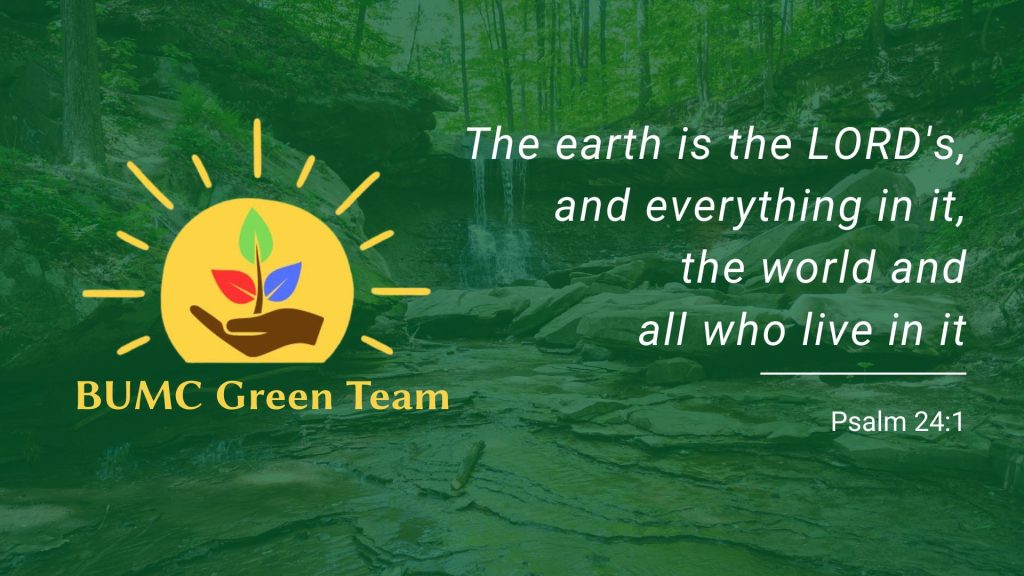
Creation Care can seem like an impossible ask. “You want me to care for God’s creation? All of it? The earth, and everything in it? Little old me?” Yes, you! In your little patch of the world. If we each tend to the spaces around us, we can change the world. Do you need creation care tips? This is the place to find them!
The spiritual practice of Creation Care is a practical way to put our faith into action. This page will include weekly creation care tips to help us each live into this call. Aligning daily choices with biblical teaching, the practice of creation care serves as an act of faith, and offers a way to actively participate in God’s redemptive work to restore all things. It’s fundamental to our call as Christians, and as United Methodists.
“Rather than treating creation as if it were placed here solely for humanity’s use and consumption, we are called to practice responsible stewardship and to live in right relationship with the Creator and with the whole of God’s creation.”
– The Community of All Creation, 2024 Social Principles
Brecksville United Methodist Church has had a long commitment to creation care, both as stewards of Creation and of the church’s financial resources. In the Fall of 2025, we started a Green Team to help us live more fully into that commitment. The Green Team’s first project is to share weekly tips about ways we can each tread more lightly while we’re here on Earth. Check back here weekly for new tips!
Small Small acts can change the world. These simple actions of environmental stewardship can contribute to a more compassionate, sustainable, and just world. By tending to the space around us, even seemingly minor efforts accumulate to create significant and lasting impact in our community.
Creation Care Tips: In The Church
We’re beginning the list with practices we already have in place at church. These are things you can do at home, too!
Tip #1: We are a no styrofoam zone
For nearly 20 years, our church has banned the use of styrofoam, the trademarked name of expanded polystyrene (EPS) foam. It isn’t the best choice for people or the environment. EPS foam is not biodegradable so it doesn’t break down naturally; it simply breaks apart into smaller pieces. (In fact, it can take 500 years to break down completely!) EPS foam is challenging to clean up when littered, contributes to microplastic pollution in our waterways, and is harmful to wildlife who can mistake it for food. What can you do?
- Choose to reuse. When planning events at church or at home, use washable plates, cups and utensils.
- Bring your own containers. When dining out, bring your own to-go container. Ask your favorite restaurant to consider going foam free.
- Consider other options. If you can’t choose reusables, choose paper, plant, starch-based, foil & metal products.
- In the grocery store select items that don’t use EPS – cardboard egg cartons, plastic free produce, and such.
Tip #2: Bring it to the bin!
Have you seen the big green bins in our parking lot (on the west side of the Little Theater)? They are there as a resource for our community to recycle anything paper (newspaper, mail, magazines, books, note books, etc.) and FLATTENED cardboard. Each month, we average about 8000 pounds of paper recycled and we have been recycling for over a decade. What has this effort saved?
If we estimate that we have recycled 96,000 pounds of paper in a decade that is the equivalent of 48 tons:
Saves 816 trees
Saves 336,000 gallons of water
Saves 158.4 cubic yards of landfill space
Reduces greenhouse gas emissions by 48 metric tons of carbon equivalent
Saves 18,240 gallons of oil
Flattening your cardboard boxes means our bins can hold even more. Imagine what we could do with more space in the bins! Remember, if it’s paper, bring it to the bin!
Tip #4: Coffee Mugs – Choose to Reuse!
Over a decade ago, our church made the decision to switch from disposable cups to washable cups for coffee hour and other church functions. We put out a call to the congregation — we’re looking for donations of coffee cups. We soon had a great collection, and you’ll often find people looking for “my mug”. John Wesley? Nascar? Rainbows? We got it. “I’d rather be 40 than pregnant”? That’s there, too! It may seem simple, but choosing reusable over disposable is an important step and one that shows genuine care for God’s creation. Are you living out that call in your every day life? Do you travel with a mug, coffee cup or reusable water bottle? It’s a great habit and a practical way to express your love of God and neighbor.
Tip #5: Recycle Your Old Phones
Prevent toxic materials like lead and mercury from polluting the environment while conserving valuable and scarce resources used to make phone, by recycling your old phones! You’ll save energy by reducing the need for new mining and manufacturing and keep the phones out of the landfill. If you’re not coming to the church building, read about other places to recycle in Cuyahoga County here.
Tip #6: Don’t Pitch Your Broken String Lights and Extension Cords
Lights for Lions is our first big Green Team project! We want to make it easy for everyone to keep broken string lights and extension cords out of the landfill. Read about three ways you can recycle them — with options during the holiday season and year round!
Check back next week for a new tip!
Advocate
As United Methodists, we are people of prayer and action! Join in the movement towards more just and sustainable policies regarding the environment. Let your voice be heard!
